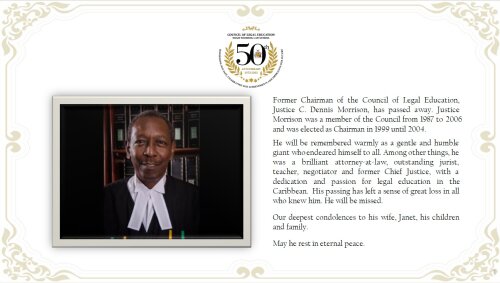Best Child Visitation Lawyers in Port of Spain
Share your needs with us, get contacted by law firms.
Free. Takes 2 min.
Free Guide to Hiring a Family Lawyer
List of the best lawyers in Port of Spain, Trinidad and Tobago
About Child Visitation Law in Port of Spain, Trinidad and Tobago:
In Trinidad and Tobago, child visitation rights are typically decided upon in the family court system. The law aims to ensure that the child maintains a relationship with both parents, even when they do not live in the same household. The child's welfare and best interest are always paramount considerations. It's important to note that these rights are not restricted to biological parents, other family members, such as grandparents, can also apply for visitation rights.
Why You May Need a Lawyer:
Hiring a lawyer can be beneficial in many situations regarding child visitation rights. Whether parents are divorcing or separating, establishing a fair and mutually agreeable visitation arrangement can be complicated. A lawyer can ensure that your interests are fully represented. Legal advice can also be helpful if the other parent isn't respecting the predetermined visitation schedule or you want to change the visitation agreement.
Local Laws Overview:
The Children's Act 2012 is an important piece of legislation impacting child visitation in Trinidad and Tobago. This law states that the welfare of the child is the court's primary concern in making any decisions. The child's views, depending on age and understanding, are also considered. The law also promotes maintaining contact with parents who do not have custody and supports the involvement of grandparents and other relatives in the child's life.
Frequently Asked Questions:
Can I deny visitation if child support isn't paid?
No, it isn't recommended to deny visitation rights based on whether child support payments are being made. The rights to visitation and child support are separate issues according to the law. It's advisable to consult with a lawyer if child support payments aren't being made.
Can the visitation schedule be modified?
Yes, visitation schedules can be modified. However, to do so legally and with minimal conflict, it is a good idea to involve a lawyer and possibly return to court to make the changes official.
Can grandparents or other relatives apply for visitation rights?
Yes, under the Children's Act 2012, grandparents and other relatives can apply for visitation rights. The rights are granted based on the best interests of the child.
Who decides on the visitation schedule?
Typically, visitation schedules are decided by both parents. If an agreement can't be reached, the court may step in to determine the schedule that's in the child's best interest.
What happens when one parent doesn't comply with the visitation schedule?
If a parent is not complying with a court-ordered visitation schedule, it might be necessary to return to court to enforce the order. Legal representation is often required in such cases.
Additional Resources:
For additional information, consulting with the Trinidad and Tobago Legal Aid and Advisory Authority can be helpful. Furthermore, the Family Court of Trinidad and Tobago and the Children's Authority of Trinidad and Tobago provide resources and support for families dealing with child visitation issues.
Next Steps:
If you require legal assistance in child visitation matters, it's advisable to seek legal advice from a family law attorney in Port of Spain, Trinidad and Tobago. They can help navigate the complex legal system, advocate for your rights, and help ensure the child's best interest is always the focus.
Lawzana helps you find the best lawyers and law firms in Port of Spain through a curated and pre-screened list of qualified legal professionals. Our platform offers rankings and detailed profiles of attorneys and law firms, allowing you to compare based on practice areas, including Child Visitation, experience, and client feedback.
Each profile includes a description of the firm's areas of practice, client reviews, team members and partners, year of establishment, spoken languages, office locations, contact information, social media presence, and any published articles or resources. Most firms on our platform speak English and are experienced in both local and international legal matters.
Get a quote from top-rated law firms in Port of Spain, Trinidad and Tobago — quickly, securely, and without unnecessary hassle.
Disclaimer:
The information provided on this page is for general informational purposes only and does not constitute legal advice. While we strive to ensure the accuracy and relevance of the content, legal information may change over time, and interpretations of the law can vary. You should always consult with a qualified legal professional for advice specific to your situation.
We disclaim all liability for actions taken or not taken based on the content of this page. If you believe any information is incorrect or outdated, please contact us, and we will review and update it where appropriate.













